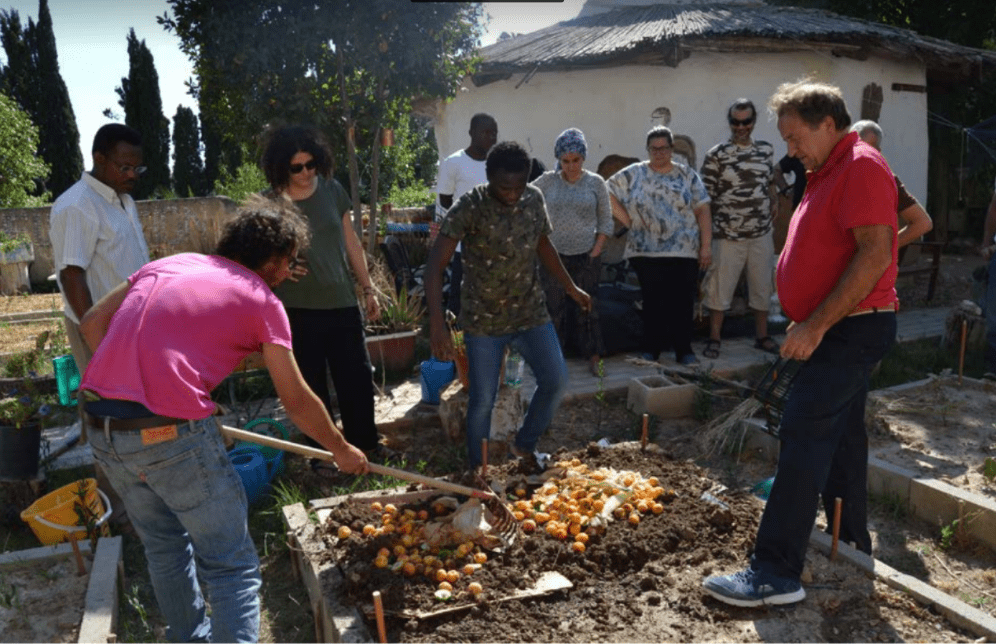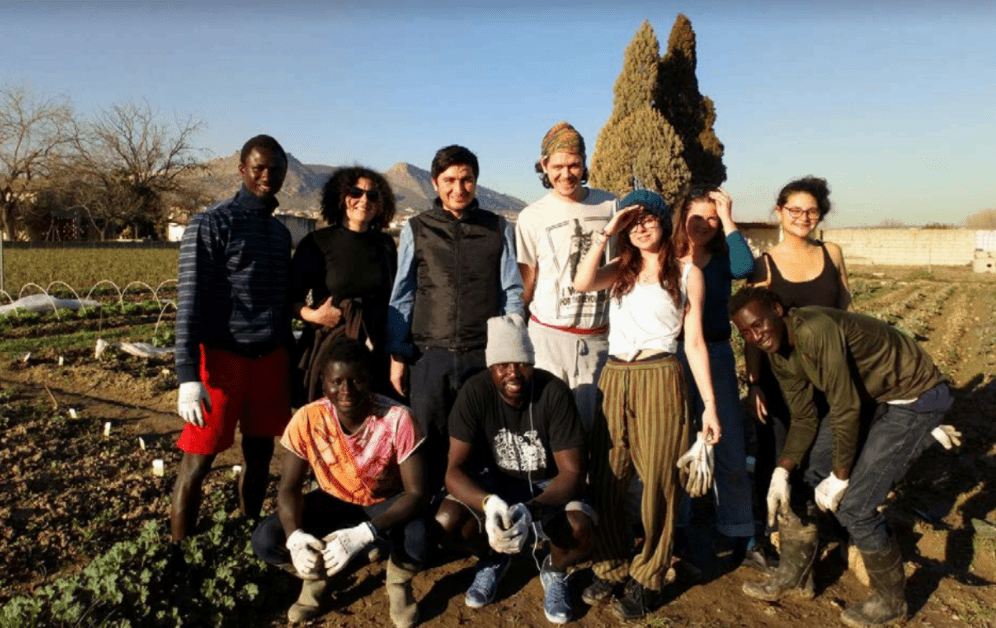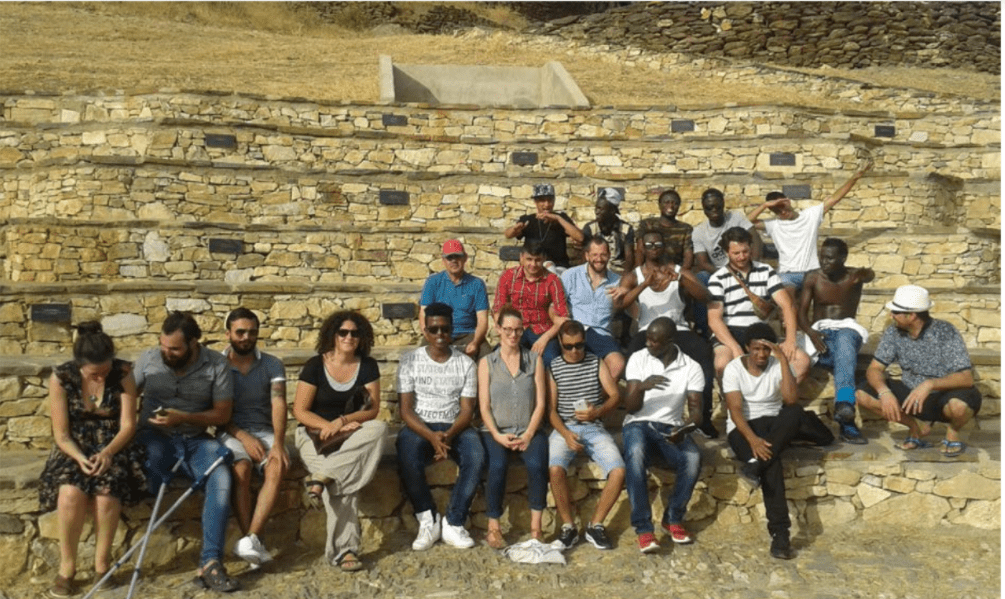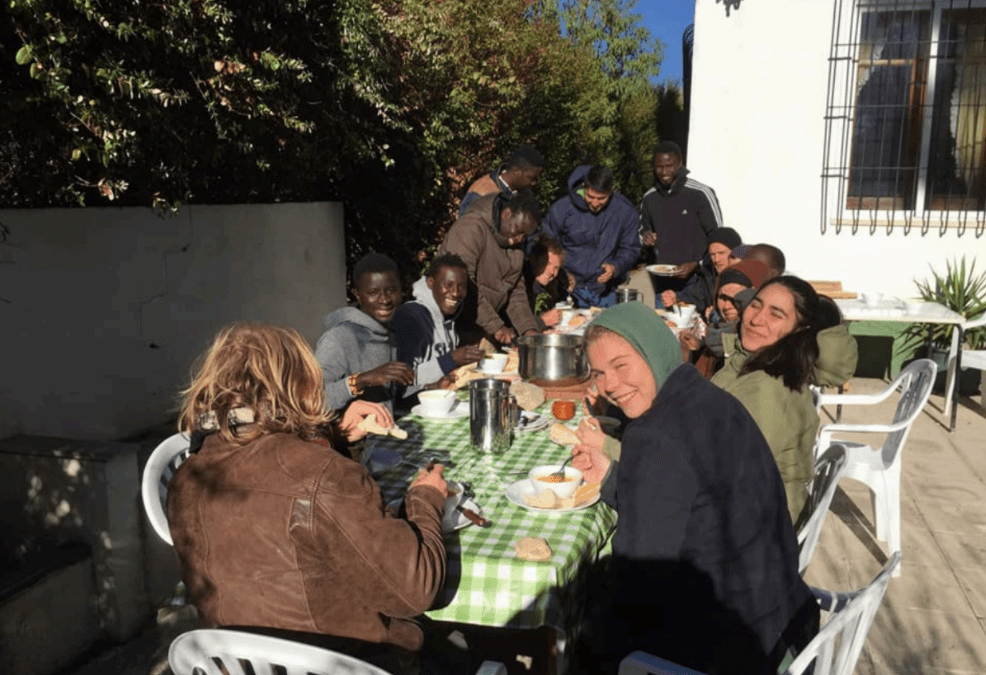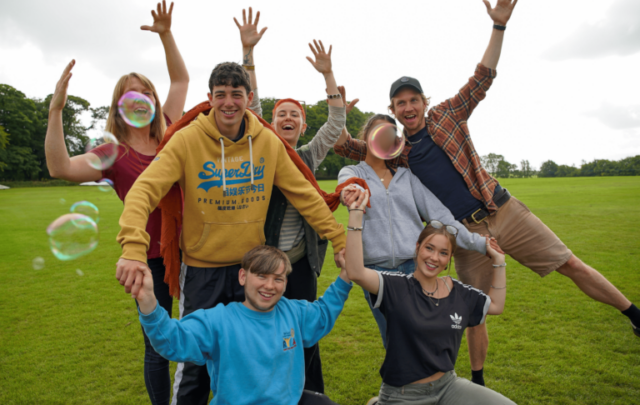This is the fifth blog from guest editors, The Eroles Project. Co-founder Ruth tells us about Regeneration Project Granada.
I am part of a group of 12 people living in the village of Saleres, Valle de Lecrín, close to Granada in Spain. We come from Europe, West Africa, South America and the Middle East. Some of us are called refugees, others expats, some locals, others migrants and some foreigners. We have a diversity of identities, legal statuses and professional trainings. Some of us are religious, queer, wealthy, poor, some of us speak many languages and others are learning to speak Spanish for the first time. What brings us together is a common willingness to co-create (and practice) a shared vision around three core values;
- integration
- sustainability
- regeneration
For the last year and a half we’ve been setting up a project while living and working as a collective that celebrates its diversity.
I am still navigating how to talk about Regeneration Project Granada without succumbing to the simplified version ‘it’s a project with migrants and refugees’; because in reality it’s much more than that – it’s a project about people learning to live in response to the particular time and place they find themselves in.
To give a sense of the team here are some of the cofounders:
Gilbert Jassey, 31, a permaculture teacher and environmental activist, persecuted in his home country The Gambia, one of the co-founders of Global Ecovillage Network Africa and now of this project.
Maria Llanos, 38, born in Madrid, a once disillusioned international development worker who has lived all over the world, now focusing on complexity and ‘doing development differently’ and writing her PhD on this project.
Habiba, 36, born in Lebanon, has a background in sustainable development and a passion for biodiversity, working on applying agroecology and other positive land practices in rural areas and now here in Spain.
And myself; Ruth, 29, from the UK, cofounder of Eroles Project, now using creative practices and facilitation to build diverse communities.
Our vision is to dynamize the socio-economic and cultural activities in the depopulating rural area where we have chosen to base the project; focusing on being responsive to the needs of locals whilst integrating – or more precisely – co-creating new cultures and ways of working. Although this vision sounds ambitious, everything happens at such a uniquely personal (and afterwards collective) level. We are not an NGO with annual targets or a municipality project with hidden agendas. The design is evolving from us, from our skills, needs, passions, beliefs.
Together we vision; together we decide; together we act.
This is not simple and requires a lot of group process and honest conversations. Our intention is to work with no hierarchies of power; instead, slowly through developing trust and mutual understanding we carve the next steps of the process enabling all of us to take a lead. This is the radical thing about this project – it challenges some of the basic structures and beliefs from which mainstream culture currently understands organising, leading and taking action.
So far we’ve been running trainings in permaculture, agroecology and commercialisation; including in February 2018 a Permaculture Design Course. We are beginning to cultivate vegetables, fruit and nuts on land leased from the municipality and last week we harvested our first produce to sell locally in Granada city. There is lots more to do in the medium and long term, for example setting up a housing co-op and ensuring financial sustainability. But, learning from permaculture, we are observing and starting small, prototyping ideas in the three strands – integration, sustainability and regeneration – and then after seeing what works developing our strategies further.
The initial idea of this project formed during a residential programme in Spain during August and September 2016 coordinated by Eroles Project. A group of 16 from all over the world gathered to enquire, share and challenge each other’s assumptions on borders, nation states, human rights and how to understand migration itself. Through this process emerged the foundational values that now exist in Regeneration Project Granada.
Some of our reflections on Borders and Migration
Migration is part of our global reality. Many species we share our planet with, the humpback whale and the arctic tern for example, were migrating before humans existed. One difference between migration patterns of the human species and other species however is control, no one asks a whale for her place of birth before she enters warmer waters. We do not think about migration like this, because we do not think of ourselves like this – as creatures. We understand ourselves as being at the top or even separate from the animal kingdom – ‘they are treated like animals’ suggests mistreatment thanks to a common belief that animal are less important than humans. Additionally to this, we as a species have created hierarchies amongst each other. This generally unchallenged way of thinking makes it possible not to pay attention to the nature of things. For example, to call free movement a human right, a ‘right’ that can then be denied.
The first movement of peoples, a hundred thousand years ago or more, archaeologists say, was a slow meandering from place to place, generation by generation adapting to new terrain, customs, traditions and a sense of place whilst journeying from Africa, through the Middle East into Europe. As we evolved from hunter gatherers to farmers, and began to survive from cultivating land, we created more defined boundaries, land ownership and political borders. These invisible lines marked the difference between clans, kingdoms, nations.
The concept of human migration today is related to the legal concept of being a citizen of a country, so then to (e)migrate – to leave one’s country is seen as a choice to leave your rights. It is considered normal for a person not to have the same rights she has at home just because she is now in another country. Let’s say a person is a doctor in her home country but then she (e)migrates and can’t work as a doctor in the new country, she has to work as a construction worker because that’s what on offer to newcomers, and, she may not have the same access to health care or social security as citizens of the new country. This appears so normal it’s almost not worth commenting on. But the general assumption that nations should priorities ‘their people’ means that there is little space for alternative thought. What would happen if all countries offered equal rights to those who decided to live there? Is the fear of wealthy countries’ losing power and their cultural heritage valid reasons to build borders?
“But what can we do? We can’t possibly let everyone in!”
I don’t have any answers to this, only more questions. However, I am stirred by political anthropologist Gregory Feldman’s argument that ‘We Are All Migrants’. It comes from the premise that humans have always migrated – and therefore our ancestors are from many parts of the world. So what defines the ‘we’ that we refer to in the above question? When fiercely defending the rights of ‘our nation’ and ‘our people’; which culture are we referring to exactly, and which people, at which point in history?
It’s a birthright
Masha Gessen Russian and American journalist, author and activist asks why in her recent article, To be or not to be, “we focus on the distinction between refugees and “economic migrants,” without asking why the fear of hunger and destitution qualifies as a lesser reason for migration than the fear of imprisonment or death by gunshot wound – and then only if that wound is inflicted for political or religious reasons. But even more than that, why do we assume that the more restricted a person’s choices have been, the more qualified they are to enter a country that proclaims freedom of personal choice to be one of its ideals?”
Within Regeneration Project Granada we try to move away from positioning each other within a hierarchy of needs. We try to suspend the assumption that someone fleeing war is more vulnerable and more in need than someone choosing to leave their country. This means that under the current legal framework we have ‘illegal migrants’ as part of our project team. Although controversial we take this risk as friends, and, on ethical grounds to challenge the racist and incoherent systems which underpin the politically motivated laws about human rights and migration.
There are not only different rights but also different social statuses associated with the terms expat, migrant and refugee. It is commonly understood that I am an expat if I migrate to a ‘poorer country’ to work and I am a migrant if I migrate to a ‘wealthier county’ to work, I am a refugee if I am fleeing from a country or situation that is legally recognised as dangerous. This inequality also extends to our ‘birthright’: born in Germany, for example, I am allowed visa-free to enter 177 countries and born in Afghanistan I am allowed visa-free to enter 24 countries.
Whose reality counts?
UNHCR figures show that 65 million people are currently displaced, many of whom will never acquire citizenship in their receiving country. In the midst of this situation, many states have focused on securing borders and the lack of independence of humanitarian organisation has limited their capacity to meet human needs. More than this, “EU institutions and Member States need to think carefully about their role in creating and fuelling conflict and human rights abuse in some of the countries from which refugees flee” The MEDMIG report critiques “EU policies on migration management, international development, foreign affairs and trade often drive and shape patterns of migration”.
The Global Migration Group’s new publication conveys the ‘innovative’ message that, with the right policies, youth migration can be “transformed from a challenge into an opportunity and achieve a triple-win, benefiting young migrants, the countries they depart from and their countries of destination”. And in an upbeat response UN Secretary General Ban Ki-Moon declares; “Together, we can empower today’s youth – tomorrow’s students, workers, entrepreneurs, parents and leaders – to achieve their full human potential in a more peaceful, equitable, inclusive and sustainable world.”
Although on the surface these appear positive statements, I am very cynical of calls to make the ‘best use’ of newcomers, as if their only worth is tied to their ability to contribute to the GDP of their host country, and as mentioned before particularly if they provide a service the country needs. It is another example of how dispensable thinking underpins the way political regulations, state security and economic growth are valued higher than human experience (indeed not only for migrants, but for many on the margins of society). The scheme for economic integration of third country nationals into the European labour market often falls short because it does not respond to the human underneath the label. 59% of refugees in Spain are unemployed. Consequently, many refugees depend on state benefits. Those who are classed as ‘illegal’ (if their asylum claim is unsuccessful or they never enter the asylum system) have an even slimmer chance of finding dignified work. This vulnerability is taken advantage of by those ready to exploit others in modern slavery in sex trafficking or illegal working conditions. In south Spain tthousands of migrants live and work in inhumane conditions in the 165 square miles of ‘plastic sea’ polytunnels around Almeria (close to where Regeneration Project Granada).
But what if we were really to ask each other – what is your highest potential?
In some ways it is exactly what Regeneration Project Granada is aiming to do. We are practicing how to create new communities that respond to the diversity of the people living within them. All the people – not only the most powerful, privileged or longstanding. We are learning about the systems in place within the municipality and La Diputacion (the region government) and joining conversations towards proactive and positive decision making that takes into consideration the highest potential and the needs of the new whole.
During situations of rapid political change there is a tendency to try to conserve one’s norms and privileges. After the Holocaust political philosopher Hannah Arendt wrote not to follow this tendency “means real exertion of the imagination, an imagination nurtured in liberation from one’s own private interests. This is a capacity that can be practised in solitude but is tested in the brightness of the public realm.”
To move beyond preservation of the status quo takes courage but from within this project I am starting to get a glimpse of how that could look. In recent years there has been a surge of radical, local, small-scale projects which welcome diversity and creatively respond to social and economic integration of migrants, refugees – people from many cultures.
What if these civil society projects from around the world formed a global network that campaigned to transform the mainstream paradigm of thought through which migration is understood? This would mean civil society taking a leading role in innovating how to decolonize our policies and move beyond thinking about citizenship as bound to a nation state.
“I encourage you within your project, work or transition group to have these conversations. I encourage you personally to consider if diversity is welcomed in the spaces you create or attend, and act if not. Find out which groups in your local area are offering support to newcomers. Begin to build links and share ways to join project, events, happenings. Strangers don’t need to stay strangers for long and these small acts can make all the difference.”
What are the challenges we are facing?
We experience racism from people outside the project and between us within the project. We expect it. We grow into racist cultures and systems, it’s exactly what we are trying to decode within us – and conflicts (although challenging) open doors to deeper trust and understanding between us. Our project gets blocked when we are not practicing these values on a daily basis. When we predict or assume another’s behaviour based on the group we perceive them to be a part of.
Regeneration Project Granada invites us to step into the mess, and stay there, weaving, playing, connecting. It is not about finding neat solutions that take only some realities into account. It’s about hearing from everyone and then building new understanding of what is needed for these times. We stumble frequently, and fall short, and then reflect on our actions and learn how to listen better, learn how we can meet all people with the question, what is your highest potential?
For more information about this project please visit – www.erolesproject.org



